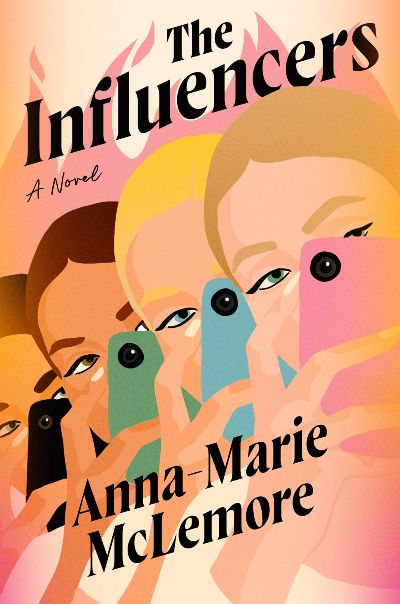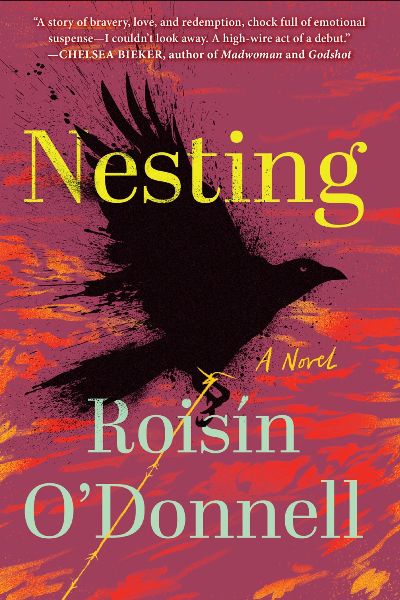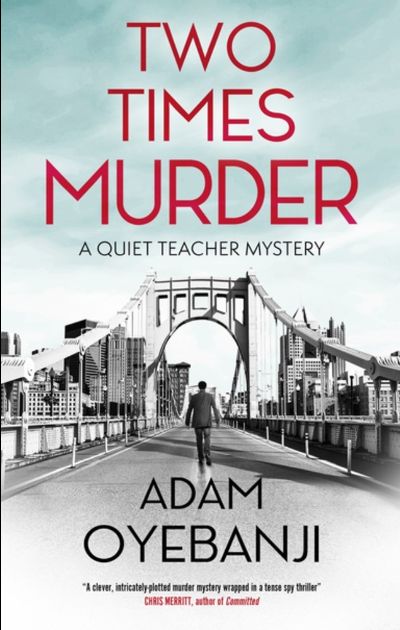The hero of Vatsal’s (Kitty Weeks series) latest absorbing historical fiction is Archana (Archie) Morley, a woman braving two new worlds: 1910 New York, where she came for a short visit but stayed after her parents died in Bombay (the novel uses the era’s language), and journalism, working for the Observer newspaper. This charming, gutsy character is barely tolerated by the boss and looked upon with suspicion by her coworkers—perhaps for wearing pants as much as for her race and gender. At home, things are better: Archie is married to the loving and supportive Dr. Phillip Morley, a health department official whose job and tony background give her access to wealth and power. But she’s interested in intriguing stories from every part of town, and won’t let go when Chinese gangsters are killed and the city imposes stern measures on Chinatown. They specifically target tiny, crooked Doyers Street, home of Mock Duck, the steely leader of the Hip Sing Tong gang, whose calm demeanor is belied by the list of gruesome crimes he’s been accused of. The racism endured by New York’s Chinese inhabitants is on stark display as Archie works to report the tangled goings on among Tammany Hall, the city’s Board of Improvement, and the gang underworld. Adding wonderful flavor is the rich detail from Vatsal’s deep research on New York City social and political history, and the gulf between the city’s “more susceptible classes” and its well-off citizens. For fans of Vatsal’s previous works and of historical fiction by Mariah Fredricks and Anna Lee Huber.
Henrietta Thornton
Arizona’s beloved father, the only one besides her mother and precious dog, Mojo, who really got her, died recently in a motorcycle accident. He was on a solo ride while mom and Arizona stayed in the trailer they travel in while the 17-year-old is being homeschooled. Mom and Arizona—who seems to be on the autism spectrum—are back in Bodie Historic Park, the California ghost town near where the accident took place, planning to spread Dad’s ashes. Arizona is barely holding things together as it is, she misses her father so viscerally, but things spiral out of control even further when her mom goes missing. It’s hard for Arizona to trust others at the best of times. But when it’s clear that harm may have come to her mom, a realistic and touching new friendship is a chance for readers to watch the girl force herself to open up to another. This is an inwardly focused book, with debut novelist Merson taking us inside Arizona’s sharp mind and exploring her feelings at having to depend on others while pushing relentlessly to uncover what happened to her family. A sparkling debut; readers, including young adults, will definitely want more from this new author.
Social media replaces life for the Iverson family, which is headed by freezing-cold May Iverson, whose Mother May I videos have chronicled the childhoods and now young adulthood of her daughters January, March, April, and twins June and July. Their real last name is Iniesta, but their Latino father and mixed-race identities are mostly swept under the carefully curated rug, except when it works for May to use it as content. The girls are both hyper-aware of their every movement as fodder for videos—how could they not be, when a genuine emotion is met with the request to do it again for the camera?—and bone-deep in the influencer life. It all threatens to collapse when May’s second husband, happily for the brand named August, is found murdered at their white-on-white home, a fire set seemingly to cover the crime. As though from multiple camera angles, the narrative unfolds over different time lines and from various characters’ perspectives, including, perfectly, “We Who Grew Up Watching the Iversons” and “We the Followers of Mother May I.” As the engaging and incredible lives of the Iverson/Iniestas unspool, a grotesque view of modern life is put under the microscope, with no pink-marble stone left unturned. One for We Who Grew Up Watching the Kardashians, of course, but also for fans of family drama and sociological skewerings.
Even during her sly, vicious husband Ryan’s “good” moments, Ciara feels “part of her body (toe tips, ear lobes, the backs of her knees) is listening, tense, on high alert.” And in his bad moments, “The toppled chair. The smashed bulb. The broken handle. Her bones and blood.” She’s left before, but his rage at her absence was too dangerous to endure. But when she sees a new opportunity, she takes her two small daughters and flees. Here the reader will begin to understand the naivete of “why doesn’t she just leave?” (Why doesn’t anybody ever ask why he doesn’t “just” leave?). Dublin’s rental market is impossible, so Ciara and the children are homeless, forced to stay in a cramped hotel room provided by the city. Ciara, who is pregnant with her third child, has no job, at controlling Ryan’s insistence, of course. Her mother-in-law tells her that she’s going to hell for treating “poor Ryan-Patrick” this way. Child support is non-existent, and Ryan is determined to take full custody of the children even though he appears to hate them and has never lifted a finger to care for them. Watching Ciara claw her way out of this is a gripping view of endurance, terror, bravery and the small and large kindnesses that make her life bearable. The characters here are superbly drawn, the dialog spot on, and I can’t wait for more from this debut novelist.
There’s more medical follow up for a sprained wrist than for having a baby, Brynn Nelson notices. She tells everyone she’s fine after her son’s birth though she’s very far from it. Every other sleepless new mother does just fine, she thinks, so there must be something wrong with her. Her husband, Ross, loves the time he spends with his son but it’s a few moments here and there and he has no idea of the deep pit of fear his wife is in. Brynn has more or less lost touch with her own mother since staying on Martha’s Vineyard with her well-off new in-laws while her poorer parents moved off-island. She’s now firmly a Nelson, and when Ross tells her a family secret after a young woman’s body washes up on the beach, Brynn finds that she has much more facing her than the exhaustion and fear of new motherhood. This thriller excels in portraying the social dichotomy that is life in an expensive resort town, a split that’s echoed throughout the book in breaks between Brynn and her family of origin, the break between the life she could have had if she had chosen another boy and this one, and her life pre- and post-motherhood. Absorbing and satisfying.
Some jobs are more permanent than others, such as working for Russia’s GRU, or secret service. Greg Abimbola, real name Grigoriy Adamovich Petrov, has left the organization and now lives a traitorous life, according to his old colleagues, in Pittsburgh. There he teaches Russian and French at a prestigious school, masquerading as a quiet British man who’s content to help students with grammar and teenage issues. Greg is mixed race, his father Black and mother white, so being an outsider is a well-worn path for him, and he’s thriving in his new life. Until, that is, GRU wants his help—and they never ask nicely. A man has been found dead in Pittsburgh, with signs that he’s Russian, possibly a man that GRU has been after, and they want to know who’s responsible. Greg then becomes a kind of double agent, as a contact he has in the Pittsburg police since he helped solve a murder (in the series debut, A Quiet Teacher, 2022) also wants his help with the mystery of the dead maybe-Russian. And then a second death, labeled a suicide but maybe a murder related to a proposed and hotly debated Diversity, Equity, and Inclusion program at another local school, sees Greg also investigating. There’s no need to read the first book to enjoy this one, but readers will undoubtedly want more from this lovable teacher who brings his spy smarts to every encounter but knows enough to conceal them when necessary—and when to drop the facade to perfect effect. The ending here is—what’s the Russian for chef’s kiss? Get this on your list!
The world of amateur true-crime investigators—and what a populous world it seems to be!—is given its own investigation in Winstead’s (Midnight is the Darkest Hour, 2023) latest, with the author using murders at a sorority house to show who benefits from and who’s destroyed by the trend of podcasters as police. Readers enter through the screen of Janeway Sharp (Star Trek fandom plays a big role here), the youngest of a group that calls itself the Real Crime Network. She’s drawn to the work after the sudden death of her beloved father and grows an obsession with true crime even though she feels it is wrong. In the Network, she finds forgiving and encouraging brethren who are only too happy to accompany her into the frightening details surrounding the murder of three sorority sisters who were stabbed and left in a bloodbath. Jane, now called Searcher, and her companions can’t stay away from the college town in question, Delphine, Idaho. Readers are taken to new viewpoints along with them, meeting the families in question, the townspeople who are suddenly besieged by murder groupies, and the police and FBI, who are willing to take the help when the Network starts to be successful. Suspects, twists, and danger add to the media-cult side of the tale, adding up to a smart whodunit with a side of contemplation.
Though she works at her parent’s bridal shop, Rosie hasn’t floated down the aisle in a white dress herself. Not that she doesn’t own one: she’s recovering from the heartbreak of getting as far as buying her dream creation, only to be rejected. It’s been a tough time emotionally and physically since Brad became the latest man to find Rosie “just too much.” She’s even had a heart transplant, and joins DonorConnect, a service that allows her to write anonymously to Morgan, the husband of Daphne, the woman whose accidental death saved Rosie’s life. Their discussions quickly—alarmingly so—become deep and revealing, and confirming her “too much” reputation, we soon see Rosie bumping into famous-author Morgan oh-so-accidentally in a cafe. At the same time, readers are getting hints that Morgan might not be as wonderful as Rosie at first thought. Combine a possibly unreliable narrator with a wow twist and side characters with shady motivations and you’ve got Collins’s compelling latest. One for Gillian Flynn’s many fans.
Camping with her crunchy-granola parents, nit-picky sisters, and assorted also-exhausting family members is Remi Finch’s idea of torture. But it’s her parent’s 40th wedding anniversary and they plan to renew their vows, so fine. She can put up with these people for a few days, especially when she sees that a handsome park ranger is part of the package. Also part of it, though, is Guy, the loathsome son of family friends, who when he was younger held Remi underwater so long she thought she’d drown. Grandma’s reaction, “even when I could still taste chlorine in the back of my throat,” was that horrible Guy obviously had a crush on her. So she’s not expecting much assistance when she finds herself in danger on the trip, a prediction that comes both true and not, as her family steps up but sometimes doesn’t know when to stop. Readers will find the Finches both a lovable and a very real family, with affection and exasperation battling for top spot in Remi’s feelings for them. The story dips into cozy territory, with the law-enforcement love interest, the off-screen killing, and the slapstick family antics, enriching a puzzling whodunit in the process. A great choice for cozy fans who enjoy a wilderness element.
In this marvelous locked-room puzzle, we’re treated to a masterclass in solving mysteries from the grand dames of the form: first-person narrator Dorothy Sayers (Lord Peter Wimsey mysteries) and fellow Queens Agatha Christie (Hercule Poirot et al), Baroness Emma Orczy (the Scarlet Pimpernel), Ngaio Marsh (Inspector Allen), and Margery Allingham (Albert Campion). As a way to be better accepted into the Detection Club, the members of which have expressed “a certain hesitancy…around having ‘an abundance of women’ in the ranks,” the women undertake the investigation of a real crime, the disappearance of a young English nurse while on a trip to France. Dorothy’s journalist husband has been assigned the story and his work gives her a reason to go to the crime scene, the other women secretly in tow–and they’re off. Meticulously following the nurse’s activities before she disappeared, as well as her life before, leads readers into a delicious look at writing conventions of the day as well as how women skirted the low expectations that sought to hold them back. Fans of the writers in question as well as of childhood favorites such as Enid Blyton’s Famous Five will enjoy the old-timey air of innocent sleuthing, while the women’s growing determination to do right by the young victim adds a satisfying air of kindness and steadfast morality. A delight from beginning to end.










